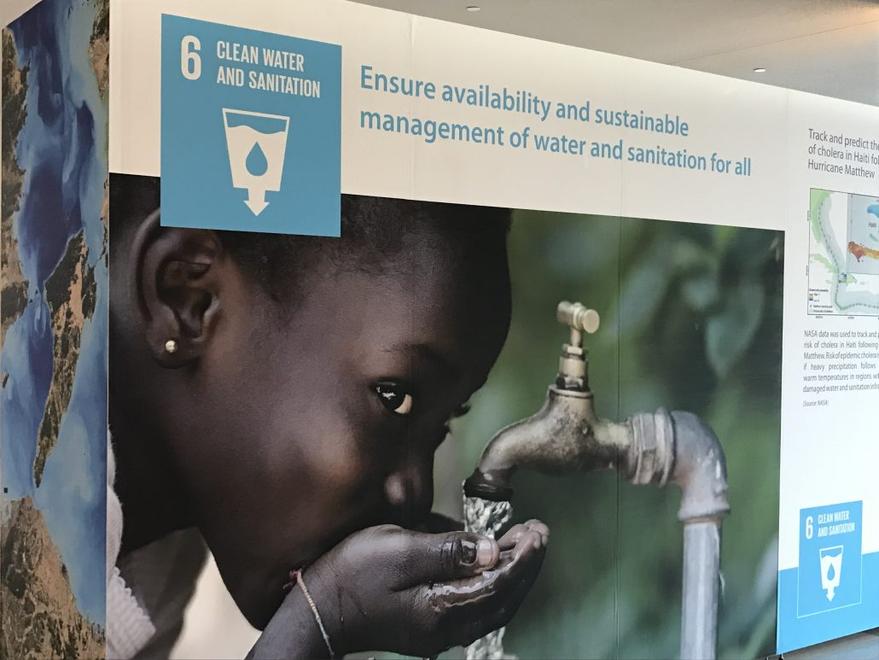Water Update at the High Level Political Forum

by May East
The first afternoon of the HLPF presented the SDG 6 Synthesis Report 2018 on Water and Sanitation.
The session, chaired by Mahmadamin Mahmadaminov, Permanent Representative of Tajikistan and ECOSOC Vice-President, reviewed the implementation of SDG 6. It was moderated by Joakim Harlin, UN-Water.
SDG 6 includes eight targets that are universally applicable and aspirational. They cover the entire water cycle including: provision of drinking water (target 6.1), sanitation and hygiene services (6.2), treatment and reuse of wastewater and ambient water quality (6.3), water use efficiency and scarcity (6.4), IWRW including through transboundary cooperation, (6.5), protecting and restoring water-related ecosystem (6.6), international cooperation and capacity building (6.a), and participation in water and sanitation management (6.b).
Yongyi Min, UN Department of Economic and Social Affairs (DESA), highlighted conflict as a barrier to achieving SDG 6, explaining that 83% of people living in fragile states lack access to safe drinking water. Noting that more than 2 billion people are affected by water stress, which will be further intensified by climate change, she cautioned that the share of ODA to water-related activities is declining.
Stefan Uhlenbrook, UNESCO, emphasised that the world is not on track to achieve SDG 6. He noted that fresh water pollution is increasing worldwide, while climate change is impacting water quality. Highlighting that water is a prerequisite for peace and stability, he called for increased water efficiency in production and in the agriculture and energy sectors.
Keynote speaker Mina Guli, water advocate and ‘ultra runner’, said she is preparing to run 100 marathons in 100 days to raise awareness of global water stress. She emphasised that the lack of access to safe drinking water perpetuates gender inequalities by increasing the time spent by women on fetching water, thus reducing the time for education and income-generating activities.
Panelist Danilo Türk, Global High-Level Panel on Water and Peace and former President of Slovenia, said the lack of political leadership for expanded water cooperation is the main obstacle to resolving the emerging water crisis. He noted the interest of the UN Security Council in exploring the links between water and peace.
Panelist Callist Tindimugaya, Ministry of Water and Environment, Uganda, called for enhanced transboundary collaboration on water management, and pointed to the role of financial and high-level political support.
Panelist Claudia Sadoff, International Water Management Institute, appealed for more circular, sustainable thinking about water. Characterising the water crisis as a crisis in water governance, she said that the critical factors in achieving SDG 6 are technology and infrastructure, as well as governance, reform and partnerships.
Panelist Lucía Ruíz, Vice Minister of Environment, Peru, highlighted the need for integrated water management and the active participation of holders of indigenous knowledge.
Lead discussant Thomas Stratenwerth, Ministry of Environment, Germany, called for a formally mandated meeting to advise the UN system on SDG 6.
Lead discussant Neil Jeffery, Water and Sanitation for the Urban Poor, outlined his company’s work in Africa and Asia on building institutional capacity.

In the discussion that followed, ALGERIA described how climate change, drought, floods and socio-economic changes have deepened water stress. The EU highlighted good governance, cross-border cooperation, and the role of water diplomacy in underpinning peace and security. SWEDEN described how water features as an important element of the country’s feminist foreign policy. MEXICO repeated a call for more political attention to SDG 6 in the HLPF process.
Léo Heller, Special Rapporteur on the Human Rights to Safe Drinking Water and Sanitation, called for a further incorporation of human rights, including the affordability principle and the treatment of inequalities in disaggregated data.
WOMEN said approaching water as a technical issue requiring mega-infrastructures does not meet the needs of women, girls, and marginalised communities. The INTERNATIONAL ATOMIC ENERGY AGENCY gave examples of using nuclear techniques for water management. FINLAND said they are looking to match their current international water strategy to the 2030 Agenda. INDONESIA outlined work in promoting access to safe drinking water and sanitation.
Lead discussant Florencio Marerua, WaterAid, underscored the importance of Water, Sanitation, and Hygiene (WASH) in preventing maternal and neonatal mortality.
Lead discussant Ney Maranhão, National Water Resources Agency, Brazil, spoke about Brazil’s experience in building water tanks to address desertification.
PALESTINE highlighted the water stress caused by the conflict with Israel. WORKERS & TRADE UNIONS cautioned against the privatisation of water systems and called for their remunicipalisation to improve equity in service delivery. SENEGAL emphasised the need for water diplomacy to ensure international peace and security. The INTERNATIONAL FUND FOR AGRICULTURAL DEVELOPMENT called for respect for the customary rights of smallholder farmers and Indigenous Peoples.
Responding to comments, Türk proposed an international conference on water management to discuss infrastructure and financing. Sadoff said cities could become water-producers, not only water-consumers.
Brief supported by IISD Briefing Paper
Under Target 6.a: Expand international cooperation and capacity building, Gaia Education in partnership with Scottish Government Hydro Nation Division, Strathclyde University, UNITAR and CREW is presenting a second iteration if its MOOC Local Water Solutions for Global Challenges, starting 24 September 2018.
For more information visit this page, and register for free here.


0 comments
Leave a comment